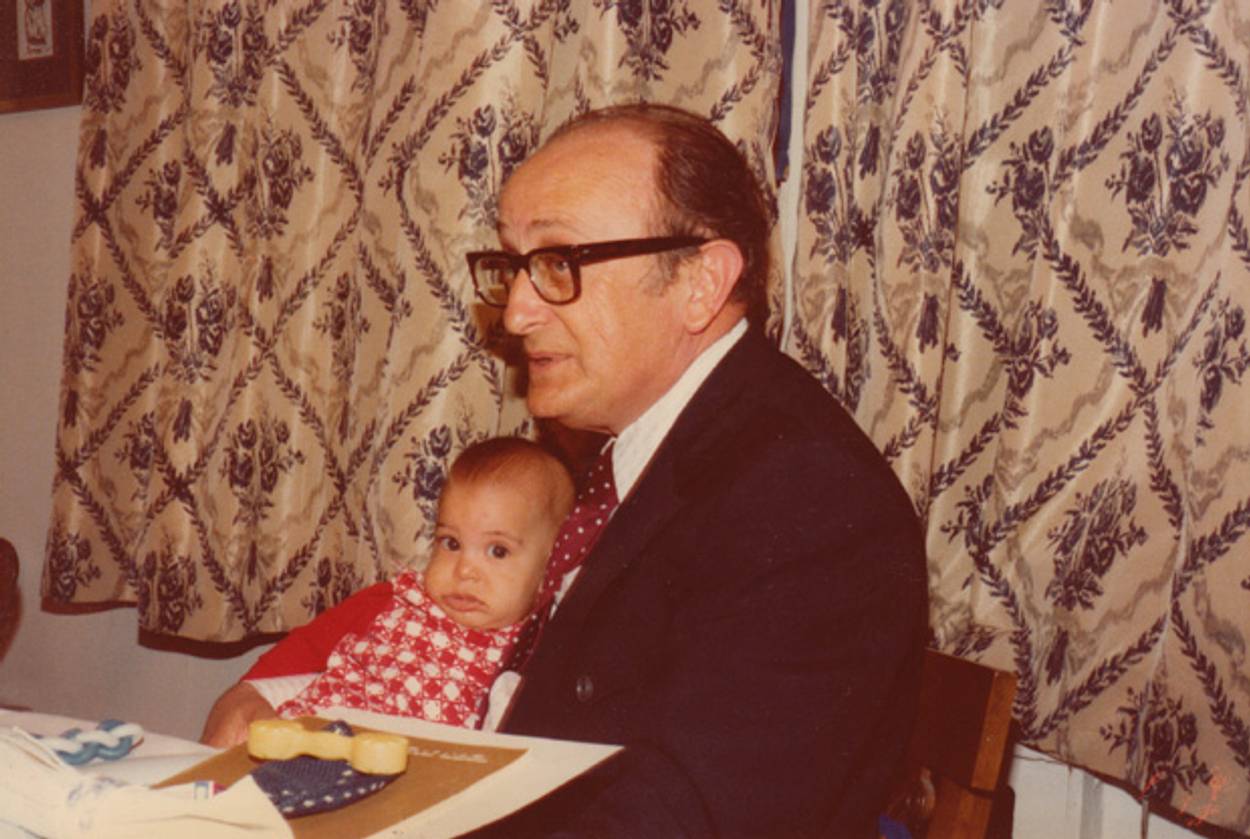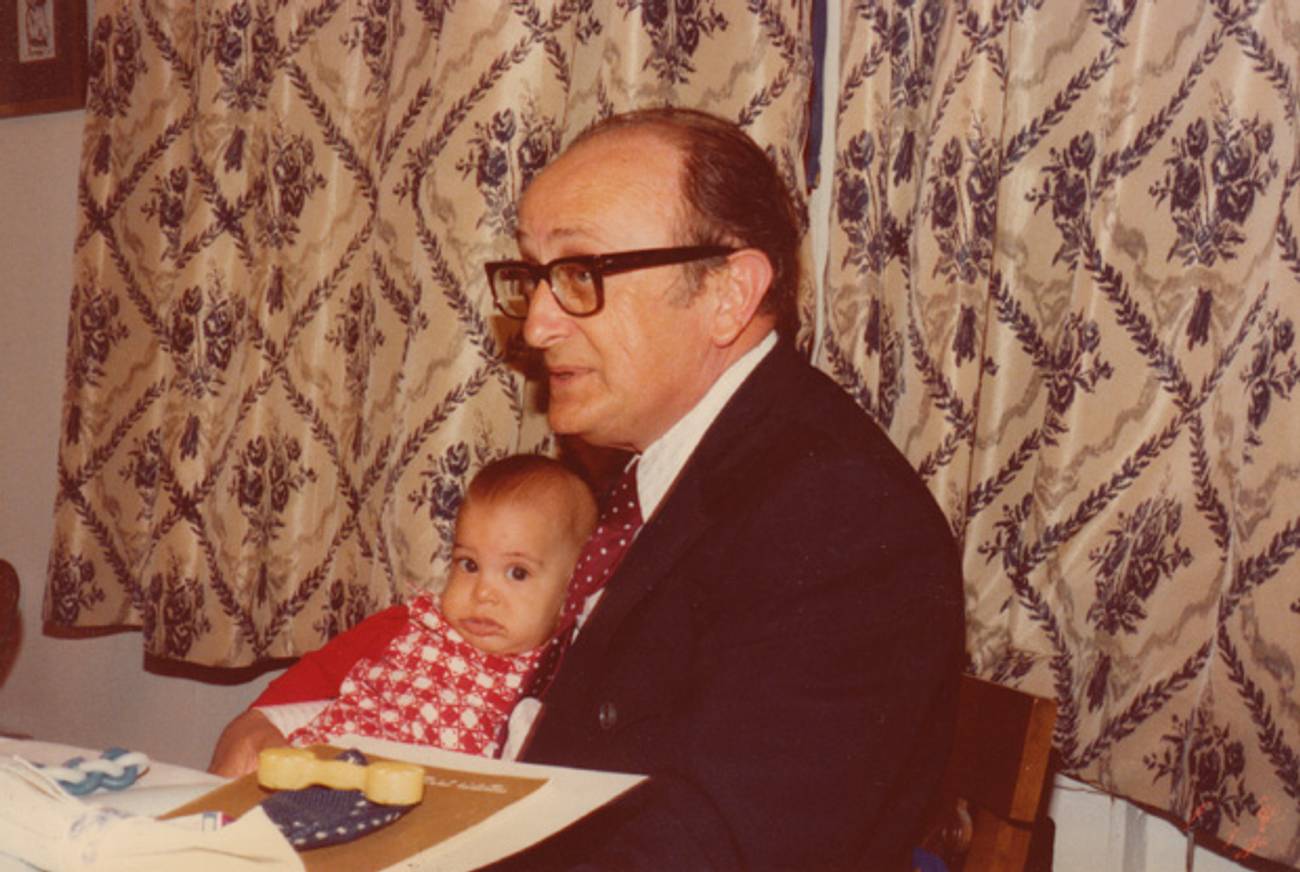Grandpa’s Secret Shoah
My grandfather never talked about his time in a concentration camp. Five years after his death, I finally heard his story.




When my grandfather Leszek was alive, he’d tell stories of his life in Krakow before the war. About how he’d sneak out of his ultra-Orthodox yeshiva to attend the Zionist gymnasium down the road. Or the times he played soccer with his grandmother’s neighbor, a boy named Karol who would eventually become Pope John Paul II. Or how he courted the beautiful older daughter of the famous Karmel family, a girl who was Jewish royalty in Krakow but somehow was convinced to love him back.
I’d listen, hanging on every Polish-accented word, trying to picture this ancient-seeming man as a teenager in love. I’d weigh my life against his, an imbalanced equation that had me—a lazy suburban fuck-up, struggling with school and a failure with girls—on one side and my grandfather, an intimidatingly brilliant Holocaust survivor, on the other. But there was always a point where his stories stopped.
He had other stories about what happened after the war: Reuniting with my grandmother Henia in a hospital room in Leipzig; returning to her the poems she wrote in the camps that she sent to him for “when the world became the world again.” Moving to America and finding work cleaning diamonds for the friend of a rich uncle in the morning, and teaching at a Lower East Side yeshiva in the afternoon. But there was a gap in his stories between “before” and “after,” a hole that I knew included a stop at the infamous Plaszów concentration camp, which was later immortalized in Steven Spielberg’s Schindler’s List. (When the film came out, his only words on the matter were: “No one should have made that film while any of us are still alive.”) When I asked him directly about his time in the camps, his reply was simply to change the subject: “History took over. How’s school?”
In fact, the only time I remember him mentioning his experience during the war was when I grew my hair long and he demanded I cut it short. Thinking I’d please him, I bought a hair trimmer and gave myself a buzz cut. That weekend, we drove to Scarsdale, to his second wife’s house, for dinner. He took one look at me and said, “You look the way we looked in the camps.” Then he turned away, the look on his face the same one I’d see when I dropped out of college the first, second, and third time, and the same one I’d see whenever I’d visit him in the nursing home. The look that said, “I’m disappointed in you.”
That was all I’d ever heard about his time in the camps, between “before” and “after.” Until last week, when I finally heard my grandfather tell his stories—five years after his death.
In 1995, a pretty, middle-aged woman with a European accent named Dora Sorell visited my grandfather’s house, along with a small camera crew, and interviewed him for Spielberg’s Shoah Foundation, as part of the Visual History Archives. For more than 12 years, the tapes sat in my father’s house, unwatched. A few months after my grandfather passed away, my father mailed them to me with a note asking me to convert them to DVD so that the family could watch the interview together. Those tapes sat on the shelf under my television for five more years, untouched, unconverted, and unwatched.
I don’t know why I avoided watching the tapes for so long. One creates images of one’s fathers and grandfathers, and mine are golems capable of superhuman feats that are at once inexplicable and inconceivable. Perhaps I needed to know only that he survived. Perhaps I was afraid to learn how he managed it, preferring to believe that his intellect alone was his superpower. Or maybe it’s simply that this golem terrified and protected me, and I wasn’t ready to let it go by learning the truth.
I also don’t know why I suddenly decided to learn my grandfather’s story, at last. It would be nice to say that something happened during our Passover Seder this month that pushed me to watch it (it didn’t), or that Yom Ha’Shoah means so much to me that I was gripped by a need to know more (it doesn’t, and I wasn’t). The truth is that I always wanted to know and had been too afraid of what I would find. The truth is that two weeks ago, I rearranged our living room and in doing so, I found myself staring at my grandfather’s tapes. There was no more avoiding it. History had taken over, and ready or not, I was going to watch. The truth is: I just wanted him to be proud of me.
***
I turn on our Paleolithic VCR, pop in tape one, and settle in to finally learn about the “during.” I watch my grandfather’s familiar pauses and laughs, hear his voice again for the first time in five years, and see things I have long forgotten, like the way he closes his eyes gently when he speaks and how his chest rises and falls as though every breath is his last … or his first.
Several times I rewind sections of tape that I miss because my mind has drifted, just as it would during Passover when he’d drone on and on about some tiny detail from the Haggadah that he thought was particularly mistaken or incomplete. Back then, I’d sit next to him, ready to perform tasks like washing his hands or passing him items from the Seder plate, worried that I’d do something wrong and have to deal with his disappointment—never anger, always just that look. Now I sit on my couch in my living room in Brooklyn, listening to him as he slips into lecture mode discussing the specifics of “what I call the ‘interbellum period of Krakow’ ” and worry that I may not have the stamina for this.
His eidetic memory delivers dates and names at such a pace that it seems, at times, rehearsed, and at other times simply overwhelming. At first, it’s a general history lesson, and I wonder if I will feel anything at all about these tapes, if I should press pause and take a walk and see what’s playing at the Cobble Hill Cinema. And then it shifts. Suddenly he’s talking about himself, and I can’t turn away.
There’s the exact date that he signs up for the Polish Army to escape deportation. The town where he hides when it becomes clear the German invasion will succeed. The name of the rabbi who marries him and my grandmother.
He talks about ditches: The schaffensfreude—the pride one feels from the act of creation—that is denied him in the ghetto when he’s sent to dig ditches and then simply fill them up again. The fear that every ditch could be a grave. And the ditch outside of Lublin that is to be his grave, until the local Gestapo head issues a last-minute reprieve.
Then there is the final selektion in the Krakow Ghetto before his deportation to Plaszów, when he forgets his jacket at home and has no number sewn onto his shirt. He describes a terrifying man with a gun and whip who screams at him and raises the whip to beat him. Here my heart pounds, here my mouth goes dry, here my lips curl as I watch him speak, effortlessly, about how my grandmother grabs the arm of Amon Gàth—the mad killer of Plaszów—and tells him, “Don’t you dare hurt my husband.”
There is so much in these two hours that cannot be captured in my words; they are barely captured in his. You have to hear his throat get dry when he talks about how cold it was and how lucky he was to work inside with the books. You have to see the moment he laughs when he recalls the endless series of coincidences that begin to add up to the improbability of his survival. You have to see his heart rate elevate as he describes the man caught whistling Russian melodies who was hanged over and over again because the rope kept breaking.
I cannot comprehend what it is to have survived. My mind balks at trying to hold in place the idea that he was truly there and that these events truly happened. And it is not until close to the end of the two hours that I finally find a glimmer of me in my grandfather and, as a result, can suddenly picture a fraction of the pain and horror that he must have felt.
“The rule in the camps was just like in the Army—never volunteer,” he says. But a man comes to the barrack one night and says that he needs men to perform a mitzvah: to dig a mass grave to bury Jewish women who were recently killed for living among the Poles. My grandfather agrees to go. He describes lifting a young woman’s naked body and holding her in his arms before burial. He says she was beautiful—a sculpture. He says he fell in love with her, then put her in the ground and covered her with a thin layer of dirt.
It is the falling in love that does it. It is the spark of humanity and truth that glowed within him that now burns in my chest as I watch this man retell these stories. All the confusion is gone. All the struggling, the pain, all the golems now melt back to Earth and all that is left is a man who once fell in love with the image of a woman and a boy who will forever be in love with his grandfather.
“To digress for a moment,” he says, his breath suddenly shallow. “As I am fully cognizant of the fact that this will be for posterity … I personally don’t like the term ‘survivor.’ It is my judgment that every morning each and every one of us waking up is a survivor. Conversely speaking, thousands of Vietnam veterans, hundreds of hostages who survived don’t identify themselves as former hostages as POWs. So, the whole notion of ‘survivor’ rubs me the wrong way, the whole notion of second generation and third generation …”
Here the interviewer interrupts: “Well, will you find a label for these people?”
“There’s no label,” my grandfather replies. “Former prisoners of Nazi concentration camps? I don’t mind following my name a B.A., M.A., or PhD … but I don’t want to brand myself as survivor … as being some accomplishment.”
These last words he speaks directly into the camera, as if to tell me that our equation will never be balanced, because the emotional calculus is false. The tape ends with photos. There is a sister I didn’t know existed, an afternoon by the docks, his father, his mother, a brother with a beard, then a photo of his grandchildren. This is the world. This is what mattered to him. The rest was just history.
***
Like this article? Sign up for our Daily Digest to get Tablet Magazine’s new content in your inbox each morning.
Aaron Wolfe is a Brooklyn-based writer, storyteller, and film editor.
Aaron Wolfe is a Brooklyn-based writer, storyteller, and film editor.